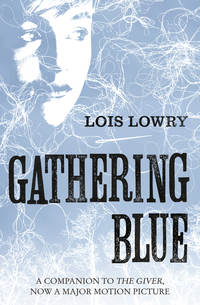
Полная версия
The Giver, Gathering Blue, Messenger, Son
Now, at this special Naming, the community performed the brief Murmur-of-Replacement Ceremony, repeating the name for the first time since the loss: softly and slowly at first, then faster and with greater volume, as the couple stood on the stage with the newchild sleeping in the mother’s arms. It was as if the first Caleb were returning.
Another newchild was given the name Roberto, and Jonas remembered that Roberto the Old had been released only last week. But there was no Murmur-of-Replacement Ceremony for the new little Roberto. Release was not the same as Loss.
He sat politely through the ceremonies of Two and Three and Four, increasingly bored as he was each year. Then a break for midday meal – served outdoors – and back again to the seats, for the Fives, Sixes, Sevens, and finally, last of the first day’s ceremonies, the Eights.
Jonas watched and cheered as Lily marched proudly to the stage, became an Eight and received the identifying jacket that she would wear this year, this one with smaller buttons and, for the first time, pockets, indicating that she was mature enough now to keep track of her own small belongings. She stood solemnly listening to the speech of firm instructions on the responsibilities of Eight and doing volunteer hours for the first time. But Jonas could see that Lily, though she seemed attentive, was looking longingly at the row of gleaming bicycles, which would be presented tomorrow morning to the Nines.
Next year, Lily-billy, Jonas thought.
It was an exhausting day, and even Gabriel, retrieved in his basket from the Nurturing Centre, slept soundly that night.
Finally it was the morning of the Ceremony of Twelve.
Now Father sat beside Mother in the audience. Jonas could see them applauding dutifully as the Nines, one by one, wheeled their new bicycles, each with its gleaming nametag attached to the back, from the stage. He knew that his parents cringed a little, as he did, when Fritz, who lived in the dwelling next door to theirs, received his bike and almost immediately bumped into the podium with it. Fritz was a very awkward child who had been summoned for chastisement again and again. His transgressions were small ones, always: shoes on the wrong feet, schoolwork misplaced, failure to study adequately for a quiz. But each such error reflected negatively on his parents’ guidance and infringed on the community’s sense of order and success. Jonas and his family had not been looking forward to Fritz’s bicycle, which they realised would probably too often be dropped on the front walk instead of wheeled neatly into its port.
Finally the Nines were all resettled in their seats, each having wheeled a bicycle outside where it would be waiting for its owner at the end of the day. Everyone always chuckled and made small jokes when the Nines rode home for the first time. “Want me to show you how to ride?” older friends would call. “I know you’ve never been on a bike before!” But invariably the grinning Nines, who in technical violation of the rule had been practising secretly for weeks, would mount and ride off in perfect balance, training wheels never touching the ground.
Then the Tens. Jonas never found the Ceremony of Ten particularly interesting – only time-consuming, as each child’s hair was snipped neatly into its distinguishing cut: females lost their braids at Ten, and males, too, relinquished their long childish hair and took on the more manly short style which exposed their ears.
Labourers moved quickly to the stage with brooms and swept away the mounds of discarded hair. Jonas could see the parents of the new Tens stir and murmur, and he knew that this evening, in many dwellings, they would be snipping and straightening the hastily done haircuts, trimming them into a neater line.
Elevens. It seemed a short time ago that Jonas had undergone the Ceremony of Eleven, but he remembered that it was not one of the more interesting ones. By Eleven, one was only waiting to be Twelve. It was simply a marking of time with no meaningful changes. There was new clothing: different undergarments for the females, whose bodies were beginning to change; and longer trousers for the males, with a specially shaped pocket for the small calculator that they would use this year in school; but those were simply presented in wrapped packages without an accompanying speech.
Break for midday meal. Jonas realised he was hungry. He and his groupmates congregated by the tables in front of the Auditorium and took their packaged food. Yesterday there had been merriment at lunch, a lot of teasing and energy. But today the group stood anxiously, separate from the other children. Jonas watched the new Nines gravitate towards their waiting bicycles, each one admiring his or her nametag. He saw the Tens stroking their new shortened hair, the females shaking their heads to feel the unaccustomed lightness without the heavy braids they had worn so long.
“I heard about a guy who was absolutely certain he was going to be assigned Engineer,” Asher muttered as they ate, “and instead they gave him Sanitation Labourer. He went out the next day, jumped into the river, swam across, and joined the next community he came to. Nobody ever saw him again.”
Jonas laughed. “Somebody made that story up, Ash,” he said. “My father said he heard that story when he was a Twelve.”
But Asher wasn’t reassured. He was eyeing the river where it was visible behind the Auditorium. “I can’t even swim very well,” he said. “My swimming instructor said that I don’t have the right boyishness or something.”
“Buoyancy,” Jonas corrected him.
“Whatever. I don’t have it. I sink.”
“Anyway,” Jonas pointed out, “have you ever once known of anyone – I mean really known for sure, Asher, not just heard a story about it – who joined another community?”
“No,” Asher admitted reluctantly. “But you can. It says so in the rules. If you don’t fit in, you can apply for Elsewhere and be released. My mother says that once, about ten years ago, someone applied and was gone the next day.” Then he chuckled. “She told me that because I was driving her crazy. She threatened to apply for Elsewhere.”
“She was joking.”
“I know. But it was true, what she said, that someone did that once. She said that it was really true. Here today and gone tomorrow. Never seen again. Not even a Ceremony of Release.”
Jonas shrugged. It didn’t worry him. How could someone not fit in? The community was so meticulously ordered, the choices so carefully made.
Even the Matching of Spouses was given such weighty consideration that sometimes an adult who applied to receive a spouse waited months or even years before a Match was approved and announced. All of the factors – disposition, energy level, intelligence and interests – had to correspond and to interact perfectly. Jonas’s mother, for example, had higher intelligence than his father; but his father had a calmer disposition. They balanced each other. Their Match, which like all Matches had been monitored by the Committee of Elders for three years before they could apply for children, had always been a successful one.
Like the Matching of Spouses and the Naming and Placement of newchildren, the Assignments were scrupulously thought through by the Committee of Elders.
He was certain that his Assignment, whatever it was to be, and Asher’s too, would be the right one for them. He only wished that the midday break would conclude, that the audience would re-enter the Auditorium, and the suspense would end.
As if in answer to his unspoken wish, the signal came and the crowd began to move towards the doors.

NOW JONAS’S GROUP had taken a new place in the Auditorium, trading with the new Elevens, so that they sat in the very front, immediately before the stage.
They were arranged by their original numbers, the numbers they had been given at birth. The numbers were rarely used after the Naming. But each child knew his number, of course. Sometimes parents used them in irritation at a child’s misbehaviour, indicating that mischief made one unworthy of a name. Jonas always chuckled when he heard a parent, exasperated, call sharply to a whining toddler, “That’s enough, Twenty-three!”
Jonas was Nineteen. He had been the nineteenth newchild born his year. It had meant that at his Naming, he had already been standing and bright-eyed, soon to walk and talk. It had given him a slight advantage the first year or two, a little more maturity than many of his groupmates who had been born in the later months of that year. But it evened out, as it always did, by Three.
After Three, the children progressed at much the same level, though by their first number one could always tell who was a few months older than others in his group. Technically, Jonas’s full number was Eleven-nineteen, since there were other Nineteens, of course, in each age group. And today, now that the new Elevens had been advanced this morning, there were two Eleven-nineteens. At the midday break he had exchanged smiles with the new one, a shy female named Harriet.
But the duplication was only for these few hours. Very soon he would not be an Eleven but a Twelve, and age would no longer matter. He would be an adult, like his parents, though a new one and untrained still.
Asher was Four, and sat now in the row ahead of Jonas. He would receive his Assignment fourth.
Fiona, Eighteen, was on his left; on his other side sat Twenty, a male named Pierre whom Jonas didn’t like much. Pierre was very serious, not much fun, and a worrier and tattletale, too. “Have you checked the rules, Jonas?” Pierre was always whispering solemnly. “I’m not sure that’s within the rules.” Usually it was some foolish thing that no one cared about – opening his tunic if it was a day with a breeze; taking a brief try on a friend’s bicycle, just to experience the different feel of it.
The initial speech at the Ceremony of Twelve was made by the Chief Elder, the leader of the community who was elected every ten years. The speech was much the same each year: recollection of the time of childhood and the period of preparation, the coming responsibilities of adult life, the profound importance of Assignment, the seriousness of training to come.
Then the Chief Elder moved ahead in her speech.
“This is the time,” she began, looking directly at them, “when we acknowledge differences. You Elevens have spent all your years till now learning to fit in, to standardise your behaviour, to curb any impulse that might set you apart from the group.
“But today we honour your differences. They have determined your futures.”
She began to describe this year’s group and its variety of personalities, though she singled no one out by name. She mentioned that there was one who had singular skills at caretaking, another who loved newchildren, one with unusual scientific aptitude, and a fourth for whom physical labour was an obvious pleasure. Jonas shifted in his seat, trying to recognise each reference as one of his groupmates. The caretaking skills were no doubt those of Fiona, on his left; he remembered noticing the tenderness with which she had bathed the Old. Probably the one with scientific aptitude was Benjamin, the male who had devised new, important equipment for the Rehabilitation Centre.
He heard nothing that he recognised as himself, Jonas.
Finally the Chief Elder paid tribute to the hard work of her committee, which had performed the observations so meticulously all year. The Committee of Elders stood and was acknowledged by applause. Jonas noticed Asher yawn slightly, covering his mouth politely with his hand.
Then, at last, the Chief Elder called number One to the stage, and the Assignments began.
Each announcement was lengthy, accompanied by a speech directed at the new Twelve. Jonas tried to pay attention as One, smiling happily, received her Assignment as Fish Hatchery Attendant along with words of praise for her childhood spent doing many volunteer hours there, and her obvious interest in the important process of providing nourishment for the community.
Number One – her name was Madeline – returned, finally, amidst applause, to her seat, wearing the new badge that designated her Fish Hatchery Attendant. Jonas was certainly glad that that Assignment was taken; he wouldn’t have wanted it. But he gave Madeline a smile of congratulation.
When Two, a female named Inger, received her Assignment as Birthmother, Jonas remembered that his mother had called it a job without honour. But he thought that the Committee had chosen well. Inger was a nice girl though somewhat lazy, and her body was strong. She would enjoy the three years of being pampered that would follow her brief training; she would give birth easily and well; and the task of Labourer that would follow would use her strength, keep her healthy and impose self-discipline. Inger was smiling when she resumed her seat. Birthmother was an important job, if lacking in prestige.
Jonas noticed that Asher looked nervous. He kept turning his head and glancing back at Jonas until the group leader had to give him a silent chastisement, a motion to sit still and face forward.
Three, Isaac, was given an Assignment as Instructor of Sixes, which obviously pleased him and was well deserved. Now there were three Assignments gone, none of them ones that Jonas would have liked – not that he could have been a Birthmother, anyway, he realised with amusement. He tried to sort through the list in his mind, the possible Assignments that remained. But there were so many he gave it up; and anyway, now it was Asher’s turn. He paid strict attention as his friend went to the stage and stood self-consciously beside the Chief Elder.
“All of us in the community know and enjoy Asher,” the Chief Elder began. Asher grinned and scratched one leg with the other foot. The audience chuckled softly.
“When the committee began to consider Asher’s Assignment,” she went on, “there were some possibilities that were immediately discarded. Some that would clearly not have been right for Asher.
“For example,” she said, smiling, “we did not consider for an instant designating Asher an Instructor of Threes.”
The audience howled with laughter. Asher laughed, too, looking sheepish but pleased at the special attention. The Instructors of Threes were in charge of the acquisition of correct language.
“In fact,” the Chief Elder continued, chuckling a little herself, “we even gave a little thought to some retroactive chastisement for the one who had been Asher’s Instructor of Threes so long ago. At the meeting where Asher was discussed, we retold many of the stories that we all remembered from his days of language acquisition.
“Especially,” she said, chuckling, “the difference between snack and smack. Remember, Asher?”
Asher nodded ruefully, and the audience laughed aloud. Jonas did, too. He remembered, though he had been only a Three at the time himself.
The punishment used for small children was a regulated system of smacks with the discipline wand: a thin, flexible weapon that stung painfully when it was wielded. The Childcare specialists were trained very carefully in the discipline methods: a quick smack across the hands for a bit of minor misbehaviour; three sharper smacks on the bare legs for a second offence.
Poor Asher, who always talked too fast and mixed up words, even as a toddler. As a Three, eager for his juice and crackers at snacktime, he one day said “smack” instead of “snack” as he stood waiting in line for the morning treat.
Jonas remembered it clearly. He could still see little Asher, wiggling with impatience in the line. He remembered the cheerful voice call out, “I want my smack!”
The other Threes, including Jonas, had laughed nervously. “Snack!” they corrected. “You meant snack, Asher!” But the mistake had been made. And precision of language was one of the most important tasks of small children. Asher had asked for a smack.
The discipline wand, in the hand of the Childcare worker, whistled as it came down across Asher’s hands. Asher whimpered, cringed, and corrected himself instantly. “Snack,” he whispered.
But the next morning he had done it again. And again the following week. He couldn’t seem to stop, though for each lapse the discipline wand came again, escalating to a series of painful lashes that left marks on Asher’s legs. Eventually, for a period of time, Asher stopped talking altogether, when he was a Three.
“For a while,” the Chief Elder said, relating the story, “we had a silent Asher! But he learned.”
She turned to him with a smile. “When he began to talk again, it was with greater precision. And now his lapses are very few. His corrections and apologies are very prompt. And his good humour is unfailing.” The audience murmured in agreement. Asher’s cheerful disposition was well-known throughout the community.
“Asher.” She lifted her voice to make the official announcement. “We have given you the Assignment of Assistant Director of Recreation.”
She clipped on his new badge as he stood beside her, beaming. Then he turned and left the stage as the audience cheered. When he had taken his seat again, the Chief Elder looked down at him and said the words that she had said now four times, and would say to each new Twelve. Somehow she gave it special meaning for each of them.
“Asher,” she said, “thank you for your childhood.”
The Assignments continued, and Jonas watched and listened, relieved now by the wonderful Assignment his best friend had been given. But he was more and more apprehensive as his own approached. Now the new Twelves in the row ahead had all received their badges. They were fingering them as they sat, and Jonas knew that each one was thinking about the training that lay ahead. For some – one studious male had been selected as Doctor, a female as Engineer, and another for Law and Justice – it would be years of hard work and study. Others, like Labourers and Birthmothers, would have a much shorter training period.
Eighteen, Fiona, on his left, was called. Jonas knew she must be nervous, but Fiona was a calm female. She had been sitting quietly, serenely, throughout the Ceremony.
Even the applause, though enthusiastic, seemed serene when Fiona was given the important Assignment of Caretaker of the Old. It was perfect for such a sensitive, gentle girl, and her smile was satisfied and pleased when she took her seat beside him again.
Jonas prepared himself to walk to the stage when the applause ended and the Chief Elder picked up the next folder and looked down to the group to call forward the next new Twelve. He was calm now that his turn had come. He took a deep breath and smoothed his hair with his hand.
“Twenty,” he heard her voice say clearly. “Pierre.”
She skipped me, Jonas thought, stunned. Had he heard wrong? No. There was a sudden hush in the crowd, and he knew that the entire community realised that the Chief Elder had moved from Eighteen to Twenty, leaving a gap. On his right, Pierre, with a startled look, rose from his seat and moved to the stage.
A mistake. She made a mistake. But Jonas knew, even as he had the thought, that she hadn’t. The Chief Elder made no mistakes. Not at the Ceremony of Twelve.
He felt dizzy, and couldn’t focus his attention. He didn’t hear what assignment Pierre received, and was only dimly aware of the applause as the boy returned, wearing his new badge. Then: Twenty-one. Twenty-two.
The numbers continued in order. Jonas sat, dazed, as they moved into the Thirties and then the Forties, nearing the end. Each time, at each announcement, his heart jumped for a moment, and he thought wild thoughts. Perhaps now she would call his name. Could he have forgotten his own number? No. He had always been Nineteen. He was sitting in the seat marked Nineteen.
But she had skipped him. He saw the others in his group glance at him, embarrassed, and then avert their eyes quickly. He saw a worried look on the face of his group leader.
He hunched his shoulders and tried to make himself smaller in the seat. He wanted to disappear, to fade away, not to exist. He didn’t dare to turn and find his parents in the crowd. He couldn’t bear to see their faces darkened with shame.
Jonas bowed his head and searched through his mind. What had he done wrong?

THE AUDIENCE WAS clearly ill at ease. They applauded at the final Assignment; but the applause was piecemeal, no longer a crescendo of united enthusiasm. There were murmurs of confusion.
Jonas moved his hands together, clapping, but it was an automatic, meaningless gesture that he wasn’t even aware of. His mind had shut out all of the earlier emotions: the anticipation, excitement, pride, and even the happy kinship with his friends. Now he felt only humiliation and terror.
The Chief Elder waited until the uneasy applause subsided. Then she spoke again.
“I know,” she said in her vibrant, gracious voice, “that you are all concerned. That you feel I have made a mistake.”
She smiled. The community, relieved from its discomfort very slightly by her benign statement, seemed to breathe more easily. It was very silent.
Jonas looked up.
“I have caused you anxiety,” she said. “I apologise to my community.” Her voice flowed over the assembled crowd.
“We accept your apology,” they all uttered together.
“Jonas,” she said, looking down at him, “I apologise to you in particular. I caused you anguish.”
“I accept your apology,” Jonas replied shakily.
“Please come to the stage now.”
Earlier that day, dressing in his own dwelling, he had practised the kind of jaunty, self-assured walk that he hoped he could make to the stage when his turn came. All of that was forgotten now. He simply willed himself to stand, to move his feet that felt weighted and clumsy, to go forward, up the steps and across the platform until he stood at her side.
Reassuringly she placed her arm across his tense shoulders.
“Jonas has not been assigned,” she informed the crowd, and his heart sank.
Then she went on. “Jonas has been selected.”
He blinked. What did that mean? He felt a collective, questioning stir from the audience. They, too, were puzzled.
In a firm, commanding voice she announced, “Jonas has been selected to be our next Receiver of Memory.”
Then he heard the gasp – the sudden intake of breath, drawn sharply in astonishment, by each of the seated citizens. He saw their faces; the eyes widened in awe.
And still he did not understand.
“Such a selection is very, very rare,” the Chief Elder told the audience. “Our community has only one Receiver. It is he who trains his successor.
“We have had our current Receiver for a very long time,” she went on. Jonas followed her eyes and saw that she was looking at one of the Elders. The Committee of Elders was sitting together in a group; and the Chief Elder’s eyes were now on one who sat in the midst but seemed oddly separate from them. It was a man Jonas had never noticed before, a bearded man with pale eyes. He was watching Jonas intently.
“We failed in our last selection,” the Chief Elder said solemnly. “It was ten years ago, when Jonas was just a toddler. I will not dwell on the experience because it causes us all terrible discomfort.”
Jonas didn’t know what she was referring to, but he could sense the discomfort of the audience. They shifted uneasily in their seats.
“We have not been hasty this time,” she continued. “We could not afford another failure.”
“Sometimes,” she went on, speaking now in a lighter tone, relaxing the tension in the Auditorium, “we are not entirely certain about the Assignments, even after the most painstaking observations. Sometimes we worry that the one assigned might not develop, through training, every attribute necessary. Elevens are still children, after all. What we observe as playfulness and patience – the requirements to become Nurturer – could, with maturity, be revealed as simply foolishness and indolence. So we continue to observe during training, and to modify behaviour when necessary.







